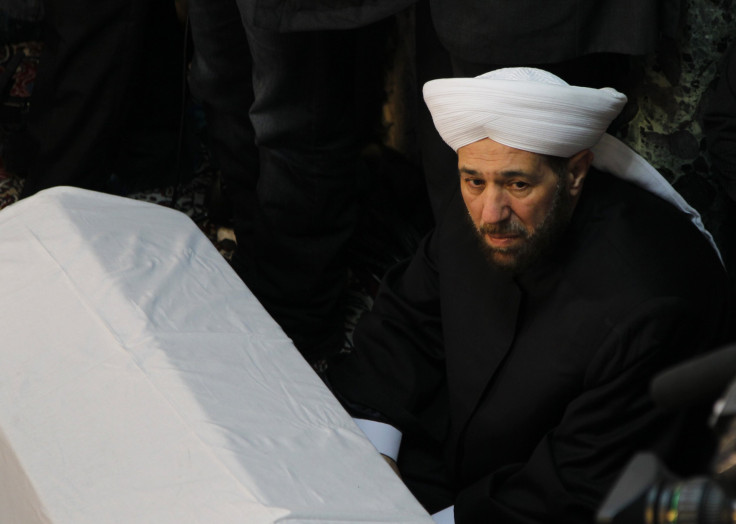In Syria’s Civil War, Fighters From Iran, Hezbollah And Iraqi Shiites Respond To The Fatwa To Fight With Assad Against Rebels

DAMASCUS, Syria -- A new brand of foreign fighter is appearing in Syria, including its capital city. They are fighting the rebels alongside Syrian regime troops in the country’s uprising-turned-civil war, which last month marked its second anniversary. When not on the front lines, the foreign fighters seem to be protecting the Assad regime and its main installations in the heart of Damascus.
This trend comes on the heels of an unprecedented fatwa issued last month by the government-installed Grand Mufti of Syria Ahmad Hassoun, calling on “all Muslims to come and join the fight” alongside the Syrian Army.
The presence in Syria of Iranian Revolutionary Guard militiamen, Lebanese Hezbollah combatants and Iraqi Shiite Muslim fighters -- all staunch supporters of embattled President Bashar Assad -- has been an open secret for months. But now, it appears, they are more numerous and visible than ever.
In the tragically rising sectarian rhetoric that aims to pit Shiite Muslim versus Sunni Muslim in Syria’s armed rebellion, observers point out that Iran and its client organization Hezbollah, based in southern Lebanon, are Shiite Muslim. The Assad regime, which has ruled Syria with an iron fist for more than 40 years, is Alawite, a Shiite Muslim offshoot sect.
From the first days of Syria’s uprising, the Assad regime has claimed that it was never the Syrian people who took to the streets, but rather “terrorists and foreign fighters” affiliated with al Qaeda, a code word for Sunni Muslim militants.
But the presence of foreign fighters among the rebels has been wildly exaggerated. The few journalists who have managed in the past few weeks to enter the northern parts of Syria, where rebels are in control of many areas, say most of them are Syrian, with only a small percentage of foreign fighters in their midst.
Ironically, today, the rising presence of foreign fighters appears to be among regime forces, with a marked presence in Damascus.
City residents and activists claim that Iranian Revolutionary Guards man some checkpoints in highly sensitive areas, such as Sit Zeinab, a densely populated Damascus suburb that sprawls around an important religious shrine with special significance for Shiite Muslims.
Some activists also swear they have come across the notorious Revolutionary Guards around the presidential private residence area in the center of Damascus.
And this video on YouTube claims to show Iraqi armed fighters in Sit Zeinab singing along and dancing to a typically Iraqi song. The lyrics celebrate being a Shiite Muslim warrior.
On the front lines, rebels constantly claim to have captured foreign fighters, or to have engaged with them in battle. This video on YouTube allegedly shows an interview by a journalist on Al Arabiya, a prominent Saudi-owned news channel, of a captured Iranian fighter.
IBTimes could not independently verify the accuracy of these videos.
Fatwa Wars
It was a sign of desperation when Syrian Grand Mufti Hassoun issued a fatwa on state television calling on Syria’s youth and the world’s Muslims to join the government’s fight against the rebels.
“I urge the sons of Syria to join the army and fight for the unity of this great country,” Hassoun said.
He called on parents to push their children “toward this sacred duty, and do not worry, for they will not be killed, only rewarded by God.”
He added that “all Muslims are obligated to come and fight” alongside Assad’s troops.
The fatwa, or ruling by a religious authority, left many Syrians stunned, and it sparked a flurry of counter-fatwas by outraged clergymen throughout the region.
“How absurd? The same Assad regime that championed itself as secular and the supposed protector of Christians and other minorities is now calling on jihadists to fight?” said one Damascene, echoing the general sentiment among Syria’s opposition.
Muftis around the Arab world reacted with strong words.
One Saudi-based cleric said it was “the likes of Bashar who should be killed. He is responsible for the blood of innocent men, women and children.”
Another cleric promised Hassoun would end up with “hot coal in your mouth,” a theological reference to Hell. He said the killing of Hassoun is justified the minute a foreign fighter heeds Hassoun’s call.
“I promise you, Hassoun, if we notice that even one fighter has entered Syria after your wicked fatwa, then know that shedding your blood has become halal,” he said. Halal is a religious term that means “permitted.”
Taking Religion In Your Own Hands
These days in Syria, muftis are not the only ones claiming to speak in the name of God or sanctioning the killing of other people.
Tempers have been running high among Damascenes, including those who root for the uprising, over mortar shells fired by rebels onto residential neighborhoods in the capital. The rebels claim they are aiming at specific government buildings, but poor targeting lands the shells where they kill civilians in the streets -- and, on a couple of occasions, in their homes.
“The rebels need to show some regard for our lives,” cried one Damascene who supports the rebels.
But the real outcry came after statements on social media tried to justify the rebels’ behavior.
“Why are people worried? If they get killed accidentally during these courageous operations, they become martyrs,” said one user, echoing a fatwa by the controversial, Saudi-based cleric Adna al Arour.
Outraged users responded in kind, saying it was he who posted the comment who should “offer himself up for martyrdom.”
One Damascene expressed disappointment at what he called the hijacking of Syria’s revolution by absurd religiosity.
“I hate to criticize the rebels, because I support them to the bone,” he said. “But everyone is playing God, and we the people go splat between their feet.”
© Copyright IBTimes 2025. All rights reserved.





















